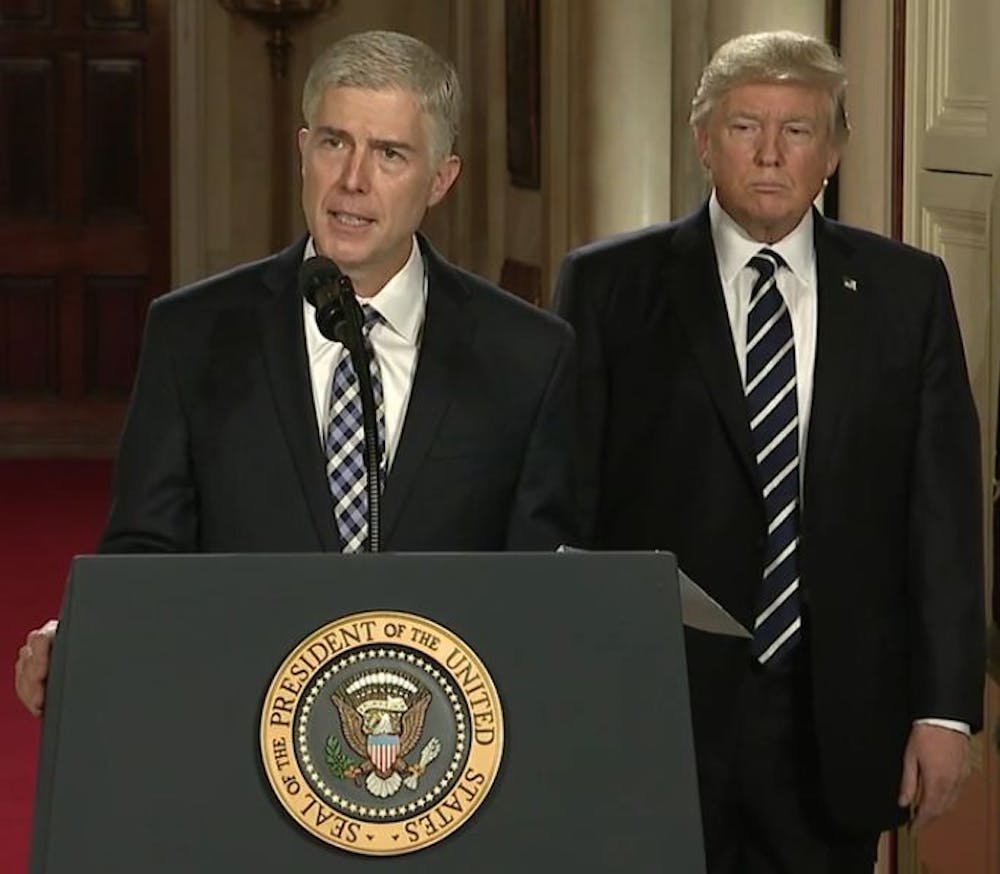While many Americans are celebrating Valentine’s Day with fancy dinners and love letters, the United States Congress is continuing its year-long love affair with the vacant Supreme Court seat.
Former Supreme Court Associate Justice Antonin Scalia died one year and one day ago, triggering a political power struggle for Republicans and Democrats. Under the Constitution’s authority, President Barack Obama selected his pick to replace Scalia. Merrick Garland, a U.S. circuit judge, was the reserved, humble and left-leaning candidate that Democrats thought would be ideal for America’s high court.
Not only would Garland tip the four conservative — four liberal split in favor of the Democrats, but he wasn’t radical enough for his nomination to be denied.
The Senate used its Constitutional powers to hold a nomination hearing and subsequently voted against Garland in the summer of 2016 anyway. Since then, the country searched for a better candidate to fill the vacant seat.
Wrong.
What actually happened is the Republican-controlled Senate never put Garland’s nomination up for vote. They argued Obama was a lame duck and shouldn’t be involved in nominating a Supreme Court justice, let alone decide the court’s political balance. Though the Constitution doesn’t touch on the circumstance, there is some informal precedence.
The New York Times didn’t miss a beat, and within weeks of Scalia’s death it published an article about what is known as the “Biden Rule.” This refers to a speech former Vice President Joe Biden gave as a senator in 1992. He said the first George Bush administration should not nominate anyone for the Supreme Court during an election season.
The circumstances of his speech are debated 25 years later, but it serves as one example of the political tactics used by senators on both sides of the aisle. The question is, what strategy will the Democrats employ now?
As the Wall Street Journal reported on Jan. 3, Garland’s nomination finally died in early 2017. The Republicans won the battle and it is now up to President Donald Trump to get his pick to the Supreme Court.
Nearly every day since Trump’s inauguration, news headlines report how Democrats are trying to vehemently oppose cabinet nominations. Despite capturing the limelight, boycotting Senate hearings and interrogating nominees, Democrats are yet unable to derail any of Trump’s picks.
But the grand finale finally kicked off. Trump nominated U.S. Court of Appeals Judge Neil Gorsuch to fill Scalia’s seat. Gorsuch turned in his questionnaire to the Senate Judiciary Committee on Saturday, according to The Hill, the latest step toward a confirmation hearing.
Gorsuch needs 60 of 100 votes to be confirmed. While Republicans have a majority in the Senate at 52, they will still need to get some Democrats on board. But is it payback time?
The Senate is turning into a mudslinging contest. Sen. Richard Blumenthal, a Democrat of Conneticut, said he will use every legal tool he can to block Gorsuch if necessary, according to The Washington Post. This includes the famous filibuster, which Republicans could potentially throw out for Supreme Court nomination hearings.
Democrats may settle for Gorsuch, realizing Trump could have tried to get someone more radical on the Supreme Court. Or, Democrats may turn this into a bitter war. But that could serve more than just revenge.
Trump’s executive order on immigration could make its way to the Supreme Court with or without Gorsuch. If Republicans can get Gorsuch on the bench, they can lock in the highest court of the land. This would effectively allow Republican domination of all three branches of government. Legal and political tactics can delay Trump’s executive orders, but Democrats will have to fight hard if they want to challenge Trump and win.
For the second year, there will be no love lost in the battle for the Supreme Court.





The Slate welcomes thoughtful discussion on all of our stories, but please keep comments civil and on-topic. Read our full guidelines here.